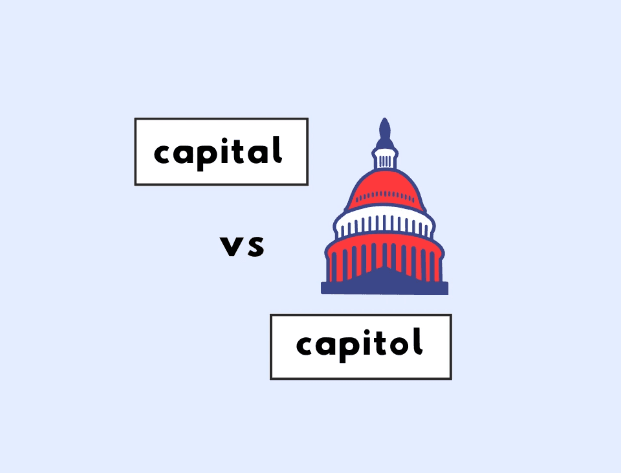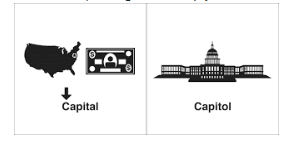From Governance to Geography: Exploring Capital vs Capitol

English can be confusing for non-native speakers because of its wide range of words and similar terms and homophones.
For example, 'capital' can mean a city or money, while 'capitol' refers to a legislative building. Remembering the differences can be difficult, even though they're used in distinct situations.
This blog post will simplify the 'capital vs capitol' confusion to help you understand it better.
What is a Homophone?
Homophones are words that sound the same but have different meanings and are often spelt differently. For example, 'pear' (a fruit) and 'pair' (a set of two). Another instance is 'peace' (absence of conflict) versus 'piece' (a part of something).
Confusing, right? But don't worry; we've got you covered. Check out this list of Clapingo blogs on such confusing homophones - Lier vs Liar, Principal vs Principle, and more.
Understanding 'Capital'
'Capital' is a term with multiple meanings.
It could refer to a city serving as the seat of government, such as New Delhi being the capital of India. The word can also mean an uppercase letter, for instance, 'A' is the capital letter of 'a'. Additionally, in business language, 'capital' refers to financial resources or assets. For example, you might hear someone say, "I need to raise capital for my startup."
Let's recap the various meanings of 'Capital':
City serving as the seat of government: "New Delhi is the capital of India."
Uppercase Letter: "Please write your name in capital letters."
Financial resources or assets: "Raising capital for a new venture can be challenging."
Understanding 'Capitol'
Contrary to 'capital', the term 'Capitol' has a specific meaning. It refers to a building where legislative work occurs. In American English, it often denotes the building where the US Congress meets.
For instance: "The US Capitol in Washington DC is an iconic structure where legislative decisions are made."
How to Differentiate Between ‘Capital’ and ‘Capitol’?
A common challenge for English learners in India is distinguishing between similar-sounding words like 'capital' and 'capitol'. Let's explore the capital vs capitol difference.
Usage
Capital: This term can mean a city that serves as the seat of government, a significant wealth resource, or an upper-case letter. Example: New Delhi is the capital of India.
Capitol: This term specifically refers to a building where legislative activities occur. Example: The Rashtrapati Bhavan is the capitol of India.
Meaning
Capital: Besides signifying a chief city, 'capital' also means wealth in business contexts or an uppercase alphabet.
Capitol: 'Capitol' refers only to a building housing legislative offices.
Context
Capital: You would use 'capital' while discussing cities, business assets, or grammar.
Capitol: You would use 'capitol' when referring to governmental buildings.
Here's a simple diagram to help you understand the differences.

Real-world Examples and Practice
Let's explore 'capital' and 'capitol' in everyday contexts.
Capital: Ram was excited to visit Delhi, India's capital city, for a business meeting.
Capitol: Rohan saw the grand US Capitol building when he visited Washington D.C for a conference.
Now it’s your turn! Determine whether to use 'capital' or 'capitol' in these sentences.
The _________ of India is New Delhi.
The _________ building is where legislative decisions are made.
Amsterdam is known as the '_________ of Art'.
Solutions:
1. capital, 2. capitol, 3. capital
Regular practice with examples of 'capital' and 'capitol' will help you understand and use these words in both spoken and written English.
Common Mistakes & How To Avoid Them
Here are some simple tips to remember capital and capitol:
Memorise Definitions: Understand that 'capital' refers to cities or money, while 'capitol' refers to a particular type of building.
Use Mnemonics: Remember this phrase - "O" in capitol is for "Office", pointing towards legislative buildings.
Practice: Regularly practice using these words in sentences until you are comfortable distinguishing between them.
Read and Listen: Engage with English language content – news articles, podcasts, novels– where these terms are frequently used can help your understanding.
How Can Clapingo Help?
At Clapingo, we have personalised English learning that focuses on homophones among many other things. Our one-on-one coaching sessions can help learners understand difficult or confusing English terms.
You'll also have access to a wealth of resources on our platform - including blogs and videos on common homophones, grammar rules, and more. You can book a quick demo to see if Clapingo fits your needs.
Key Takeaways
In our exploration of 'capital' vs 'capitol', we've learned some essential things.
While both words look strikingly similar, they carry distinct meanings. The term 'capital' broadly refers to a city that serves as the seat of government in a country or state, financial assets, or even the uppercase letters. Conversely, 'capitol' specifically means a building where legislative activities occur.
Practising with the provided exercises and examples will help to understand the difference between capital vs capitol.
To further improve your learning, check out Clapingo’s services. Clapingo's personalised coaching sessions are designed for unique language needs.
FAQs
1. What is the difference between 'Capital' and 'Capitol'?
'Capital' mainly refers either to a city that serves as the head of government in a country or state, or to wealth or resources. For example, "Delhi is the capital of India" or "He made a significant capital investment in his business."
On the other hand, 'Capitol' specifically refers to a building where legislative work is conducted. In the USA, for instance, "The Capitol in Washington D.C. is where Congress meets."
2. Can you provide some examples to illustrate ‘Capital’ and ‘Capitol’ usage?
Let's consider some capital vs capitol examples.
For Capital: (a) “Mumbai is known as the financial capital of India.” (b) “She invested a sizable amount of her capital into real estate.”
For Capitol: “The US Capitol Building was stormed by protestors.”
3. Is there any easy trick to remember the difference between ‘Capital’ and ‘Capitol’?
An easy way to remember the capital vs capitol difference is by focusing on the spelling. The 'o' in Capitol can stand for 'office' or 'official', both typically associated with governmental buildings. That way, you'll always remember that Capitol refers to a legislative building!
Comments
Your comment has been submitted